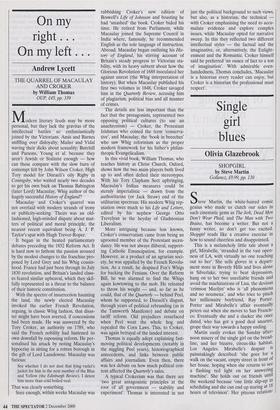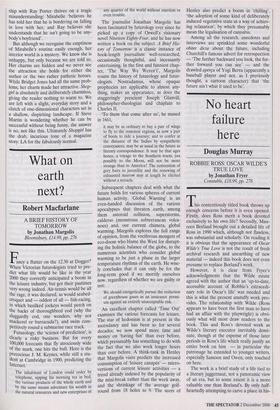Single girl blues
Olivia Glazebrook
SHOPGIRL by Steve Martin
Gollancz, £9.99, pp. 130
Steve Martin, the white-haired comic genius who made us clutch our sides in such cinematic gems as The Jerk, Dead Men Don't Wear Plaid, and The Man with Two Brains, has become a writer. But not a funny writer, so don't get too excited. Shopgirl reads like a creative exercise in how to sound cheerless and disappointed.
This is a melancholy little tale about a girl, Mirabelie, 'stranded in the vast open- ness of LA, with virtually no one reaching out to her'. She sells gloves in a depart- ment store in Beverly Hills and lives alone in Silverlake, trying to beat depression, hang on to her two unreliable friends and avoid the machinations of Lisa, the devious 'crimson Marilyn' who is 'all phenomena and no noumena', and who tries to pinch her millionaire boyfriend, Ray Porter. Porter and Mirabelle's affair eventually peters out when she moves to San Francis- co. Eventually she and a slacker she once dated, who has got a good deal smarter, grope their way towards a happy ending.
Martin easily evokes the Sunday after- noon misery of the single girl on the bread- line, and her bizarre, circus-like habitat, Los Angeles. Mirabelle's despair Is painstakingly described: 'she goes for a walk on the vacant, empty street in front of her house, hoping when she returns to see a flashing red light on her answeriq machine'. She holds out on friends until the weekend because 'one little slip-up in scheduling and she can end up staring at 18 hours of television'. Her piteous relation- ship with Ray Porter thrives on a tragic misunderstanding: Mirabelle 'believes he has told her that he is bordering on falling in love with her, and Ray believes she understands that he isn't going to be any- body's boyfriend'. But although we recognise the emptiness of Mirabelle's routine easily enough, her interior world is a mystery. We know she is unhappy, but only because we are told so. Her charms are hidden and we never see the attraction she holds for either the author or the two rather pathetic heroes. While Bridget Jones had all the same prob- lems, her charm made her attractive. Shop- girl is absolutely and deliberately charmless, giving the reader nothing to warm to. We are left with a slight, everyday story and a clutch of one-dimensional characters set in a shallow, dispiriting landscape. If Steve Martin is wondering whether he can be successful without being funny, the answer is no, not like this. Ultimately Shopgirl has the drab, incurious tone of a magazine story: LA for the fabulously normal.



















































































 Previous page
Previous page